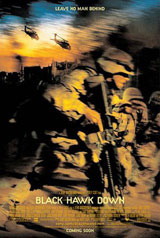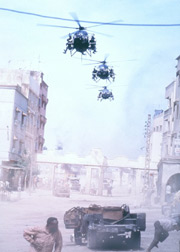|
Black Hawk Down
|
| |
 |
USA, 2001. Rated R. 144 minutes.
Cast:
Josh Hartnett, Ewan McGregor, Tom Sizemore, Eric Bana, William Fichtner,
Ewen Bremner, Sam Shepard, Jason Isaacs, Gabriel Casseus, Kim Coates,
Hugh Dancy, Ron Eldard, Ioan Gruffudd, Tom Guiry, Charlie Hofheimer, Jeremy
Piven, Danny Hoch, Zeljko Ivanek, Brendan Sexton III, Johnny Strong, Richard
Tyson, Brian Van Holt, Nikolaj Coster-Waldau, Steven Ford, Ian Virgo,
Tom Hardy, Gergory Sporleder, Carmine Giovinazzo, Chris Beetem, Tac Fitzgerald,
Matthew Marsden, Orlando Bloom
Writers: Ken Nolan and Steven Zaillian, based on the book by Mark
Bowden
Music: Hans Zimmer, Mel Wesson (ambient music)
Cinematographer: Slavomir Izdiak
Producers: Jerry Bruckheimer, Ridley Scott
Director: Ridley Scott
LINKS
|
 t
is 1993, and civil war rages in Somalia. Famine on a massive scale leads to
hundreds of thousands dead. Crime lords, including Mohamed Farah Aidid, are
confiscating U.N. food supplies intended for the starving population. A multinational
U.N. force intervenes to protect the food. On October 3, in Mogadishu, a U.S.
Delta Force and Army Ranger team, part of the U.N. peacekeeping force, undertakes
to kidnap two cabinet-level ministers in Aidid's "government." The mission is
supposed to take less than an hour, but it goes horribly wrong, leaving dozens
of U.S. soldiers stranded in hostile sections of the city. By the next morning,
eighteen U.S. soldiers are dead and many more wounded. Oh, not that the film
makes much of this point, but a thousand Somalis lose their lives, too.
t
is 1993, and civil war rages in Somalia. Famine on a massive scale leads to
hundreds of thousands dead. Crime lords, including Mohamed Farah Aidid, are
confiscating U.N. food supplies intended for the starving population. A multinational
U.N. force intervenes to protect the food. On October 3, in Mogadishu, a U.S.
Delta Force and Army Ranger team, part of the U.N. peacekeeping force, undertakes
to kidnap two cabinet-level ministers in Aidid's "government." The mission is
supposed to take less than an hour, but it goes horribly wrong, leaving dozens
of U.S. soldiers stranded in hostile sections of the city. By the next morning,
eighteen U.S. soldiers are dead and many more wounded. Oh, not that the film
makes much of this point, but a thousand Somalis lose their lives, too.
The product of the powerhouse team of producer Jerry Bruckheimer and director
Ridley Scott, Black Hawk Down is a superior war movie that's at its best
focusing on the meticulously realized details of that day. Bruckheimer and Scott's
effort to look at the forest instead of the trees, however, falls on its face.
Black Hawk Down is beautiful and harrowing, but, curiously, does not
resonate.
The U.S. plan on October 3 is to ambush a secret meeting of Aidid's lieutenants
with troops transported via Black Hawk helicopters. The forces would prefer
to use armored helicopters, but none are available to them--the U.S. role is
limited, and so are U.S. resources. Simultaneously, an armored convoy is supposed
to enter the hostile zone of Mogadishu to go to the meeting site to pick up
the prisoners.
AboutFilm.Com
The Big Picture
|
| Alison |
-
|
| Carlo |
B
|
| Claudia |
B+
|
| Dana |
-
|
| Jeff |
B-
|
| ratings explained |
Everything begins to go wrong when Private Blackburn (Orlando Bloom) falls
from a helicopter as it dodges a missile. Several troops are drawn from their
assigned roles to protect the prone soldier. Meanwhile, the opposition from
Aidid's militia--which appears to include every single male inhabitant of the
city, adults and children alike--is much stronger than expected. U.S. casualties
begin to mount, culminating with the downing of a Black Hawk. In a cinematic
first, the helicopter does not explode on impact.
U.S. troops fight their way to the helicopter; convoys struggle through the
city; other helicopters take immoderate risks. Black Hawk Down covers
every move, often in real time. These parts of Black Hawk Down, which
form the majority of the film, are reminiscent of the city fighting in Full
Metal Jacket, while the earlier sections (featuring a lot of helicopters
flying over shorelines) recall Apocalypse Now. Scott's baroque-yet-effective
visual style lends a certain grim beauty to the proceedings, even though some
panoramas resemble outtakes from his Gladiator.
The direction and choreography of the combat is virtuoso work.
Most effective, Scott gives each American death its own screen time, showing
how poor decision-making or conscious self-sacrifice leads to each. Every death
has its own story; each is an individual tragedy. Oddly, many of these red-blooded
American soldiers are portrayed by actors from the whole of the English-speaking
world, including Scots (Ewan McGregor and Ewen Bremner), Brits (Jason Isaacs
and Orlando Bloom), and an Australian (Eric Bana). Their American accents are
fine, except for McGregor's. It's technically accurate, but sounds exaggerated
and forced.
Scott and screenwriters Ken Nolan and Steven Zaillian take matters too far
in one melodramatic and gruesome scene involving a soldier bleeding to death.
Obviously the situation is tragic, but the ham-fisted writing makes the scene
ring false. The worst moment in the film, however, is a monologue by Staff Sergeant
Matt Eversmann (Josh Hartnett). He asks in a dumb-jock monotone why they do
it. How can they go out there? Then he answers his own question. It's all about
the soldier next to you. Nothing else matters.
What a load of horse-hooey. Yes, once the bullets start flying, it's easy to
see that nothing matters but the soldier next to you. Black Hawk Down
spends well over two hours showing us that, and the script needn't reiterate
the point. What about before the bullets start flying? All the U.S. soldiers
are volunteers. They're all willing to put their lives on the line before
the bullets start flying.  Company
Clerk John Grimes (McGregor), for example, is desperate to be released from
his typing duties so he can fight. How is it about the soldier next to you then?
The camaraderie is developed after the soldiers enlist, the bravery and self-sacrifice
comes after someone is hurt or lost. Is the movie telling us that war is necessary
so that men can forge bonds with each other? What a depressing thought. Eversmann's
theory makes no sense.
Company
Clerk John Grimes (McGregor), for example, is desperate to be released from
his typing duties so he can fight. How is it about the soldier next to you then?
The camaraderie is developed after the soldiers enlist, the bravery and self-sacrifice
comes after someone is hurt or lost. Is the movie telling us that war is necessary
so that men can forge bonds with each other? What a depressing thought. Eversmann's
theory makes no sense.
The question remains, though. Why do they do it? Scott and Bruckheimer's
answer is not complex. Looking over their filmographies, it's obvious they believe
that men do what they do because they're men, and that's what they do. This
theory worked for Scott in Gladiator, whose hero is the embodiment of
Marcus Aurelius's stoic philosophy--no accident that Marcus Aurelius is actually
in the film. It worked partly because the movie focuses on a single character's
plight and because there is identifiable evil and injustice. In contrast, Black
Hawk Down fails to clearly define the evil and injustice in Somalia.
It tries to, of course. In its exposition, it tells us about the hundreds of
thousands dead. It shows us Aidid's evil minions in their evil sunglasses evilly
keeping food away from the needy. The plight of the Somalis looks a little too
much like a music video, though, and is abandoned too quickly. After all, Scott
and Bruckheimer can't portray the U.S. casualties as pointlessly tragic if they're
also heroically meaningful. Black Hawk Down forgets about the reasons
for the U.S. intervention and changes its focus to the American soldiers haplessly
stranded in the hostile sections of Mogadishu.
At this point, the entire population of the city turns into a bunch of evil
gun-toting militiamen evilly firing indiscriminately upon our Brave Boys. Problematically,
all but one of the U.S. soldiers are white, and all their nemeses are African.
This mirrors the truth of the actual events--virtually all the soldiers involved
in combat that day were white. (Why is that?) The result, however, looks like
a race war.
The race-war effect might have been avoided if Black Hawk Down had kept
an eye on the big picture, but it doesn't. The only strong case Black Hawk
Down makes is that if we're going to stage an intervention, it better not
be half-assed. We should have all our best technology and vast resources at
our disposal. The decision to go forward with lighter Black Hawk helicopters
when heavier, armored ones prove unavailable is probably the most crucial decision
in the disaster.
Black Hawk Down rivals Platoon and a host of other films for
American self-absorption. This isn't Pearl
Harbor. We are not the Youthful Innocent, attacked unawares by a Dastardly
Foe. In Black Hawk Down we are in someone else's land, fighting indigenous
people. Maybe our mission in Somalia was necessary and just, but Black Hawk
Down needs to make more of a case for why--or why not. It can't just
weep for the soldiers and say, "It's all so pointless."
Though it's educating us about an event few of us are familiar with, Black
Hawk Down has a poor sense of politics and history. What's left is the action,
which is certainly masterful but not a raison d'Ítre--not unless you're making
a purely escapist film. That's not the intent of Black Hawk Down, so
failing to resonate on a larger human level is a critical deficiency. Black
Hawk Down is not working new ground, or old ground in a new way. It has
no insights to offer. Black Hawk Down is a war movie worth seeing, but
it fails to be the essential war film Scott and Bruckheimer want it to be.
Review
© January 2002 by AboutFilm.Com and the author.
Images © 2001 Columbia Pictures. All Rights Reserved.

 Company
Clerk John Grimes (McGregor), for example, is desperate to be released from
his typing duties so he can fight. How is it about the soldier next to you then?
The camaraderie is developed after the soldiers enlist, the bravery and self-sacrifice
comes after someone is hurt or lost. Is the movie telling us that war is necessary
so that men can forge bonds with each other? What a depressing thought. Eversmann's
theory makes no sense.
Company
Clerk John Grimes (McGregor), for example, is desperate to be released from
his typing duties so he can fight. How is it about the soldier next to you then?
The camaraderie is developed after the soldiers enlist, the bravery and self-sacrifice
comes after someone is hurt or lost. Is the movie telling us that war is necessary
so that men can forge bonds with each other? What a depressing thought. Eversmann's
theory makes no sense.
